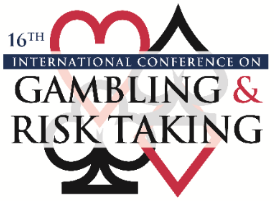Session Title
Session 2-1-C: Kids These Days: Engaging the Young about Gambling
Presentation Type
Event
Location
The Mirage Hotel & Casino, Las Vegas, Nevada
Start Date
8-6-2016 8:30 AM
End Date
8-6-2016 10:00 AM
Disciplines
Mental and Social Health | Psychology | Social and Behavioral Sciences
Abstract
Recently conducted national prevalence study of youth gambling in Croatia indicated high prevalence of adolescent gambling (especially sports betting), as well as perceived parental acceptance of such behavior (Ricijas et al, 2011). As international research suggest positive correlations between parental perception of gambling and other risk behaviors with the intensity of their childrens' participation in these behaviors (Meerkamper, Derevensky, Cutajar, 2008; Farrington, Loeber, Ttofi, 2011; Cambell et al, 2011), a new study on parental perception of gambling is currently being conducted, using two comparable perspectives - parents and their adolescent children.
Research is being conducted in two largest Croatian cities (Zagreb and Split) from October to December 2015 with expected sample of approximately N=400 parents and their adolescent children. The following instruments are being used: (1) Questionnaire on basic socio-demographic characteristics, (2) Parents as Partners Gambling Research Study (Derevensky, 2008) and (3) Gambling Activities Questionnaire.
The analysis will be based on matched pairs (parents and their children) in order to examine the hypothesis that parental and children’s perception of gambling and other risk behaviors, as well as perception of gambling accessibility in Croatia, significantly differs. Furthermore, this paper will also examine differences in parental knowledge about their children’s gambling activities compared to children’s self-report, with special emphasis on controlling the effects of child’s gender.
Research results will be considered in direction of providing guidelines for development and implementation of preventive and treatment interventions that engage both children and parents.
Keywords
youth gambling, risk behaviors, adolescents, parents’ perception of youth gambling and risk behaviors, Parents, Risk
Parents’ Perception of Youth Gambling and Other Risk Behaviors
The Mirage Hotel & Casino, Las Vegas, Nevada
Recently conducted national prevalence study of youth gambling in Croatia indicated high prevalence of adolescent gambling (especially sports betting), as well as perceived parental acceptance of such behavior (Ricijas et al, 2011). As international research suggest positive correlations between parental perception of gambling and other risk behaviors with the intensity of their childrens' participation in these behaviors (Meerkamper, Derevensky, Cutajar, 2008; Farrington, Loeber, Ttofi, 2011; Cambell et al, 2011), a new study on parental perception of gambling is currently being conducted, using two comparable perspectives - parents and their adolescent children.
Research is being conducted in two largest Croatian cities (Zagreb and Split) from October to December 2015 with expected sample of approximately N=400 parents and their adolescent children. The following instruments are being used: (1) Questionnaire on basic socio-demographic characteristics, (2) Parents as Partners Gambling Research Study (Derevensky, 2008) and (3) Gambling Activities Questionnaire.
The analysis will be based on matched pairs (parents and their children) in order to examine the hypothesis that parental and children’s perception of gambling and other risk behaviors, as well as perception of gambling accessibility in Croatia, significantly differs. Furthermore, this paper will also examine differences in parental knowledge about their children’s gambling activities compared to children’s self-report, with special emphasis on controlling the effects of child’s gender.
Research results will be considered in direction of providing guidelines for development and implementation of preventive and treatment interventions that engage both children and parents.


Comments
Attachment: PDF containing 24 slides